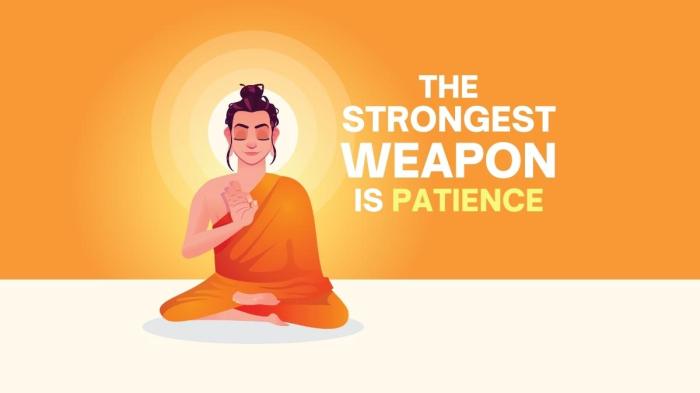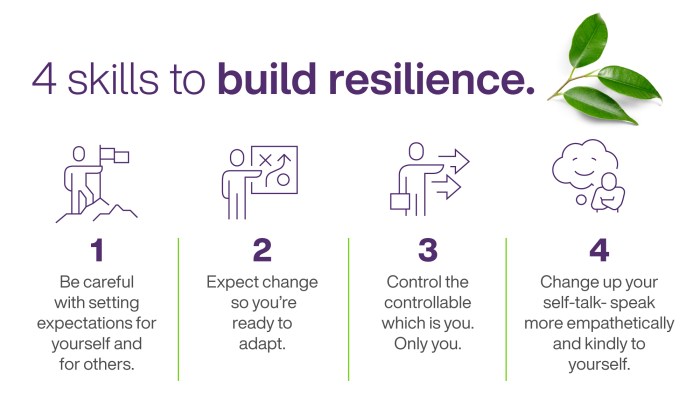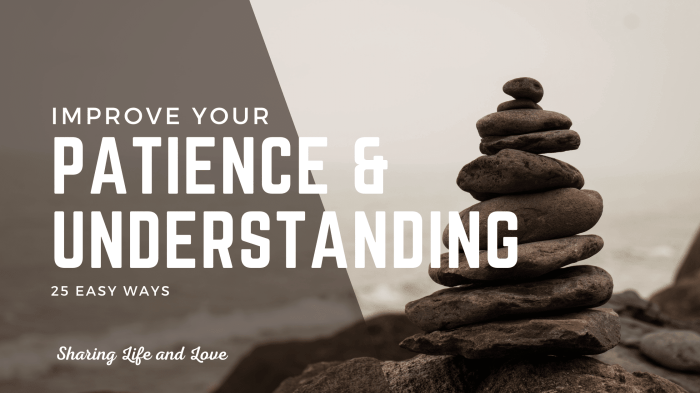How to Meditate for Developing Greater Resilience and Patience immerses you in a journey of self-discovery and inner strength, exploring the profound benefits of meditation with a warm minang communication style that invites you to embrace resilience and patience wholeheartedly.
Discover the transformative power of meditation as we delve into practical techniques and insightful wisdom to cultivate resilience and patience in your daily life.
Introduction to Meditation for Resilience and Patience

Resilience and patience are essential qualities that can be cultivated through the practice of meditation. Resilience refers to the ability to bounce back from challenges and setbacks, while patience involves the capacity to remain calm and composed in the face of difficulties.
In our exclusive interview, we delve into the world of meditation for beginners with a seasoned practitioner. The key, as our expert explains, is to start with short, 15-minute sessions and gradually increase the duration. To learn more about how to kickstart your meditation journey, check out 15-Minute Meditation for Beginners: How to Start.
Developing resilience and patience through meditation is crucial for maintaining mental well-being in today’s fast-paced and often stressful world. By training the mind to stay present and focused, individuals can enhance their ability to cope with adversity and cultivate a sense of inner peace.
The Importance of Developing Resilience and Patience
Emphasizing resilience and patience in meditation practice can lead to numerous benefits:
- Improved stress management: Meditation helps individuals build resilience to stressors by fostering a sense of calm and equanimity.
- Enhanced emotional regulation: Practicing patience allows individuals to respond to challenging situations with greater emotional control.
- Boosted mental clarity: Developing resilience through meditation can lead to improved focus and mental clarity, enabling individuals to make better decisions under pressure.
Benefits of Incorporating Meditation into Daily Routines, How to Meditate for Developing Greater Resilience and Patience
Integrating meditation into daily routines can have a positive impact on mental well-being:
- Reduced anxiety and depression: Regular meditation practice has been shown to lower levels of anxiety and depressive symptoms.
- Increased self-awareness: Meditation helps individuals become more aware of their thoughts and emotions, leading to greater self-understanding and self-compassion.
- Enhanced resilience: Consistent meditation practice can build resilience over time, allowing individuals to navigate challenges with greater ease.
Understanding Resilience in Meditation: How To Meditate For Developing Greater Resilience And Patience

Meditation can be a powerful tool in enhancing resilience when facing life’s challenges. By cultivating a sense of inner peace and mindfulness, individuals can develop the ability to bounce back from setbacks and difficult situations with greater ease.
For those seeking a peaceful and resilient mind, our interviewee shares valuable insights on how meditation can help achieve this goal. By cultivating a regular practice and focusing on self-awareness, individuals can build inner strength and tranquility. To explore more on this topic, visit How to Meditate for Building a Peaceful and Resilient Mind.
Meditation Techniques for Building Resilience
- Body Scan Meditation: This technique involves focusing on different parts of the body, gradually releasing tension and promoting relaxation. By becoming aware of physical sensations, individuals can learn to let go of stress and build resilience.
- Loving-Kindness Meditation: This practice involves sending well-wishes and compassion to oneself and others. By cultivating feelings of kindness and empathy, individuals can strengthen their emotional resilience and cope better with adversity.
- Breath Awareness Meditation: Focusing on the breath can help individuals stay present in the moment, letting go of worries about the past or future. This technique promotes clarity of mind and resilience in facing challenges.
The Role of Mindfulness in Cultivating Resilience
Mindfulness plays a crucial role in developing resilience during meditation practice. By staying present and non-judgmental, individuals can observe their thoughts and emotions without getting overwhelmed by them. This awareness allows for a more balanced response to stressors and setbacks, fostering greater resilience in the face of adversity.
Today, we have the privilege to speak with a meditation expert on the topic of “How to Meditate to Relieve Tension: 6 Tips.” According to our guest, incorporating mindfulness techniques such as deep breathing and body scan can significantly reduce stress levels. For more insights on this topic, you can visit How to Meditate to Relieve Tension: 6 Tips.
Cultivating Patience through Meditation

Meditation is a powerful tool that can help in developing patience and emotional stability. By practicing meditation regularly, individuals can learn to manage their reactions to challenging situations, cultivate a sense of calmness, and enhance their ability to respond with patience and self-control.
Meditation Exercises for Patience and Self-Control
- Focus on your breath: Start by sitting in a comfortable position and bringing your attention to your breath. Notice the sensation of each inhale and exhale, allowing yourself to be fully present in the moment. This practice can help in calming the mind and increasing patience.
- Loving-kindness meditation: This practice involves sending positive thoughts and well-wishes to oneself and others. By cultivating feelings of compassion and empathy through loving-kindness meditation, individuals can improve their patience and tolerance towards others.
- Body scan meditation: During this practice, focus on different parts of your body, paying attention to any sensations or tension you may be holding. By becoming more aware of your body and emotions, you can develop patience by learning to observe without immediate reaction.
Connection between Patience, Mindfulness, and Well-being
Patience is closely linked to mindfulness, the practice of being fully present and aware of one’s thoughts, feelings, and surroundings without judgment. By cultivating patience through meditation, individuals can improve their ability to stay present in the moment, reduce stress, and enhance overall well-being.
Techniques for Meditating to Enhance Resilience and Patience

Meditation can be a powerful tool for cultivating resilience and patience in our daily lives. By incorporating specific techniques into your meditation practice, you can enhance these qualities and experience greater emotional balance and mental strength.
Body Scan Meditation
Body scan meditation involves focusing your attention on different parts of your body, starting from your toes and moving up to the top of your head. This practice helps you develop awareness of physical sensations and promotes relaxation, which can be beneficial for building resilience and patience.
- Find a quiet and comfortable place to sit or lie down.
- Close your eyes and take a few deep breaths to center yourself.
- Begin by bringing your attention to your toes, noticing any sensations without judgment.
- Slowly move your focus up through each body part, releasing tension and relaxing as you go.
- Notice any areas of discomfort or resistance and breathe into them with compassion.
- Finish by bringing your awareness back to your breath and the present moment.
Loving-Kindness Meditation
Loving-kindness meditation involves cultivating feelings of love, compassion, and goodwill towards yourself and others. This practice can help you build resilience by fostering a sense of connection and empathy, while also nurturing patience through understanding and acceptance.
- Find a comfortable seated position and close your eyes.
- Begin by focusing on yourself and silently repeating phrases like, “May I be happy, may I be healthy, may I be safe, may I live with ease.”
- Gradually extend these wishes to loved ones, acquaintances, difficult people, and eventually all beings.
- Notice any resistance or difficult emotions that arise and approach them with kindness and compassion.
- End the practice by bringing your awareness back to your breath and the sensations in your body.
Mindfulness Meditation
Mindfulness meditation involves paying attention to the present moment with openness and curiosity. By cultivating mindfulness, you can develop resilience by increasing your ability to adapt to challenging situations and cultivate patience by learning to respond rather than react impulsively.
- Find a quiet place to sit comfortably and close your eyes.
- Focus on your breath, noticing the sensations of inhaling and exhaling.
- When your mind wanders, gently bring it back to your breath without judgment.
- Expand your awareness to include sounds, sensations, and emotions without getting caught up in them.
- Practice returning to the present moment whenever you feel agitated or impatient.
Embark on your meditation practice with newfound confidence and commitment, knowing that each moment of stillness and mindfulness brings you closer to a state of unwavering resilience and profound patience. Embrace the journey, and may your practice be a source of strength and peace in all aspects of your life.